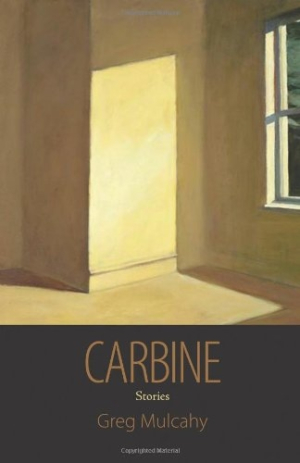Carbine
Reading the stories in Greg Mulcahy’s collection of short fiction, Carbine, is like driving slowly by a smoldering auto–truck accident on I-10 just east of New Orleans. It is filled with images that are compelling, tragic, and lasting. “He had a job he hated and a cyst in his mouth and a rage that sometimes made him feel he could pick up a car and toss it around,” says the protagonist in “Circle.” His life, like those of the other men in Carbine, is filled with the banalities of a suffocating existence without apparent meaning or end, the frustration and anger building, but never quite releasing.
Mulcahy is relentless in his pursuit of truth, waging war on anyone who dares pick up his book. In his war there are few rules. Paragraphs fade into sentence fragments. Narrative spare to begin with carries the story until it is broken, too weak to go on, and overcome by an assertive stream of consciousness.
Mulcahy guts what others might consider the heart of a story, action advanced by its players. He leaves in place, however, another life that is distilled and pure. For example, the story that gave title to the collection is devoid of almost all physical action. A man contemplates buying a gun. Mulcahy’s telling is frightening and provocative, not because he delineates the awful possibilities facing the man, but because he accepts them.
All of the stories in Carbine are outstanding for what they do not tell us; Mulcahy’s omissions extend to setting and character. The stories are of today or perhaps they happened years ago. Or perhaps they never happened. The men in the stories (and there are few women) are neither short nor tall, fat nor thin. They live somewhere, maybe the East, or the West or the South. Mulcahy strips away all non-essentials in his never-ending effort to tell what is true.
That said, Mulcahy does not make contemplating truth—that which is difficult but real—easy. Watching other people do it, and some of these characters do it badly, is even more difficult. Carbine is populated by men, isolated and on the edge, who have failed in their relationships, in their work, and in life. Through their insights, Mulcahy tells us about our world from an angle which is not always readily apparent. Like the poetry of Richard Brautigan, this is reading that can be exhausting, but never dull or disappointing.
Carbine is the fifth recipient of the Juniper Prize for Fiction, an annual award for excellence in literary fiction from the University of Massachusetts Press in collaboration with the UMass Amherst MFA Program for Poets and Writers.
Reviewed by
John Michael Senger
Disclosure: This article is not an endorsement, but a review. The publisher of this book provided free copies of the book to have their book reviewed by a professional reviewer. No fee was paid by the publisher for this review. Foreword Reviews only recommends books that we love. Foreword Magazine, Inc. is disclosing this in accordance with the Federal Trade Commission’s 16 CFR, Part 255.

